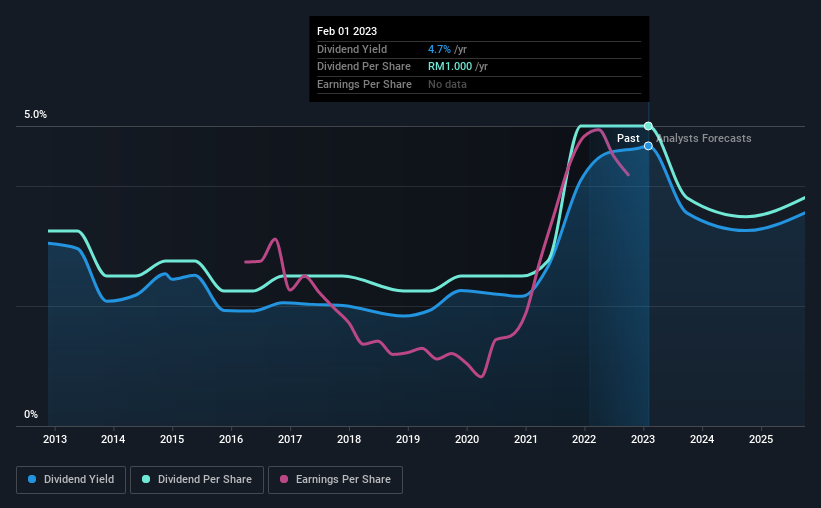Kuala Lumpur Kepong Berhad's (KLSE:KLK) Dividend Will Be MYR0.80

Kuala Lumpur Kepong Berhad (KLSE:KLK) has announced that it will pay a dividend of MYR0.80 per share on the 28th of February. Based on this payment, the dividend yield on the company's stock will be 4.7%, which is an attractive boost to shareholder returns.
See our latest analysis for Kuala Lumpur Kepong Berhad
Kuala Lumpur Kepong Berhad's Payment Has Solid Earnings Coverage
If the payments aren't sustainable, a high yield for a few years won't matter that much. Kuala Lumpur Kepong Berhad was earning enough to cover the previous dividend, but it was paying out quite a large proportion of its free cash flows. The business is earning enough to make the dividend feasible, but the cash payout ratio of 76% indicates it is more focused on returning cash to shareholders than growing the business.
EPS is set to fall by 30.7% over the next 12 months. If recent patterns in the dividend continue, we could see the payout ratio reaching 81% in the next 12 months, which is on the higher end of the range we would say is sustainable.

Dividend Volatility
The company has a long dividend track record, but it doesn't look great with cuts in the past. Since 2013, the dividend has gone from MYR0.65 total annually to MYR1.00. This works out to be a compound annual growth rate (CAGR) of approximately 4.4% a year over that time. It's encouraging to see some dividend growth, but the dividend has been cut at least once, and the size of the cut would eliminate most of the growth anyway, which makes this less attractive as an income investment.
The Dividend Looks Likely To Grow
With a relatively unstable dividend, it's even more important to see if earnings per share is growing. We are encouraged to see that Kuala Lumpur Kepong Berhad has grown earnings per share at 16% per year over the past five years. The company is paying a reasonable amount of earnings to shareholders, and is growing earnings at a decent rate so we think it could be a decent dividend stock.
In Summary
In summary, while it's good to see that the dividend hasn't been cut, we are a bit cautious about Kuala Lumpur Kepong Berhad's payments, as there could be some issues with sustaining them into the future. While Kuala Lumpur Kepong Berhad is earning enough to cover the dividend, we are generally unimpressed with its future prospects. Overall, we don't think this company has the makings of a good income stock.
Market movements attest to how highly valued a consistent dividend policy is compared to one which is more unpredictable. Meanwhile, despite the importance of dividend payments, they are not the only factors our readers should know when assessing a company. Case in point: We've spotted 3 warning signs for Kuala Lumpur Kepong Berhad (of which 1 can't be ignored!) you should know about. Is Kuala Lumpur Kepong Berhad not quite the opportunity you were looking for? Why not check out our selection of top dividend stocks.
Valuation is complex, but we're here to simplify it.
Discover if Kuala Lumpur Kepong Berhad might be undervalued or overvalued with our detailed analysis, featuring fair value estimates, potential risks, dividends, insider trades, and its financial condition.
Access Free AnalysisHave feedback on this article? Concerned about the content? Get in touch with us directly. Alternatively, email editorial-team (at) simplywallst.com.
This article by Simply Wall St is general in nature. We provide commentary based on historical data and analyst forecasts only using an unbiased methodology and our articles are not intended to be financial advice. It does not constitute a recommendation to buy or sell any stock, and does not take account of your objectives, or your financial situation. We aim to bring you long-term focused analysis driven by fundamental data. Note that our analysis may not factor in the latest price-sensitive company announcements or qualitative material. Simply Wall St has no position in any stocks mentioned.
About KLSE:KLK
Kuala Lumpur Kepong Berhad
Engages in the plantation, manufacturing, and property development businesses.
Reasonable growth potential with mediocre balance sheet.


